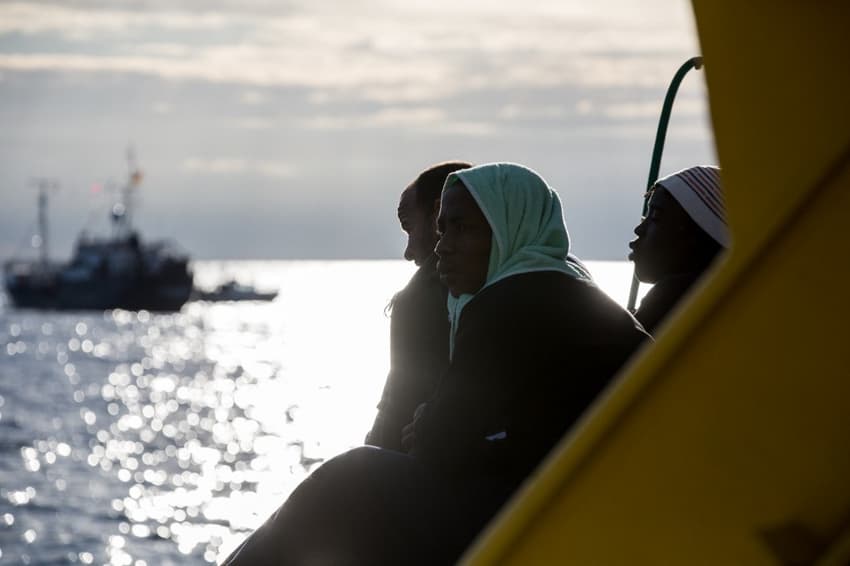How would Italy's idea for a new EU migrant distribution system work?

Italy's new government is pushing for an automatic system for distributing migrants rescued in the Mediterranean between European countries.
The plans already have the green light from France and Germany, which would take a much higher percantage of migrants than Italy, Italian media said Thursday.
READ ALSO:
The plan could also involve Luxembourg, Malta, Portugal, Romania and Spain, La Repubblica and La Stampa dailies said.
Such a deal would put an end to case-by-case negotiations over who will take those saved during the perilous crossing from North Africa, which have left vulnerable asylum seekers trapped in limbo at sea for lengthy periods.
Italian Prime Minister Giuseppe Conte is expected to discuss the plan with France's President Emmanuel Macron when the latter visits Rome next week.
It will then be studied in more detail at a meeting of interior ministers on September 23 in Malta, ahead of a European summit in October in Luxembourg.
"There is great willingness to immediately reach even a temporary accord on the redistribution of migrants, which can then be fine tuned," Conte said Wednesday during a visit to Brussels to meet European Commission head Ursula von der Leyen.
READ ALSO:
-
Why an Italian pathologist is fighting to identify the Mediterranean's migrant victims
-
Immigration to Italy: a look at the numbers
-
He suggested EU countries that decline to take part could suffer financial penalties.
The Czech Republic, Hungary, Poland and Slovakia have refused in the past to take in any of those rescued at sea.
The automatic distribution system would be a temporary solution ahead of a revision of the so-called "Dublin regulation", which assigns responsibility for migrants to the nation of first entry.
France and Germany were each willing to receive 25 percent of people plucked from flimsy dinghies in the Mediterranean, Repubblica said.
Italy would take in 10 percent - a lower proportion because it has already hosted tens of thousands of new arrivals, it said.
Should the deal take off, Rome would agree to reopen its ports to vessels which save migrants at sea, reversing a hardline stance taken by the country's ex-interior minister Matteo Salvini last year.
Under the new laws, ships that enter Italian waters without authorization face a fine of up to €1 million. The ships can also be seized.

'I migrate, you migrate, he migrates...' Protesters against another of Matteo Salvini's security decrees last year. Photo: Alberto Pizzoli/AFP
Comments (1)
See Also
The plans already have the green light from France and Germany, which would take a much higher percantage of migrants than Italy, Italian media said Thursday.
READ ALSO:
The plan could also involve Luxembourg, Malta, Portugal, Romania and Spain, La Repubblica and La Stampa dailies said.
Such a deal would put an end to case-by-case negotiations over who will take those saved during the perilous crossing from North Africa, which have left vulnerable asylum seekers trapped in limbo at sea for lengthy periods.
Italian Prime Minister Giuseppe Conte is expected to discuss the plan with France's President Emmanuel Macron when the latter visits Rome next week.
It will then be studied in more detail at a meeting of interior ministers on September 23 in Malta, ahead of a European summit in October in Luxembourg.
"There is great willingness to immediately reach even a temporary accord on the redistribution of migrants, which can then be fine tuned," Conte said Wednesday during a visit to Brussels to meet European Commission head Ursula von der Leyen.
READ ALSO:
- Why an Italian pathologist is fighting to identify the Mediterranean's migrant victims
- Immigration to Italy: a look at the numbers
He suggested EU countries that decline to take part could suffer financial penalties.
The Czech Republic, Hungary, Poland and Slovakia have refused in the past to take in any of those rescued at sea.
The automatic distribution system would be a temporary solution ahead of a revision of the so-called "Dublin regulation", which assigns responsibility for migrants to the nation of first entry.
France and Germany were each willing to receive 25 percent of people plucked from flimsy dinghies in the Mediterranean, Repubblica said.
Italy would take in 10 percent - a lower proportion because it has already hosted tens of thousands of new arrivals, it said.
Should the deal take off, Rome would agree to reopen its ports to vessels which save migrants at sea, reversing a hardline stance taken by the country's ex-interior minister Matteo Salvini last year.
Under the new laws, ships that enter Italian waters without authorization face a fine of up to €1 million. The ships can also be seized.

'I migrate, you migrate, he migrates...' Protesters against another of Matteo Salvini's security decrees last year. Photo: Alberto Pizzoli/AFP
Join the conversation in our comments section below. Share your own views and experience and if you have a question or suggestion for our journalists then email us at [email protected].
Please keep comments civil, constructive and on topic – and make sure to read our terms of use before getting involved.
Please log in here to leave a comment.